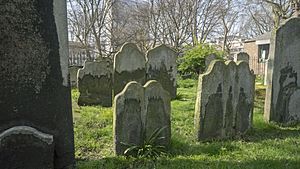Theophilus Gale facts for kids
Theophilus Gale (born in 1628, died in 1678) was an English teacher, a religious leader who didn't follow the official church rules, and a scholar of religion. He was an important figure among the English Dissenters, a group of Protestants who separated from the Church of England.
Early Life and Education
Theophilus Gale was born in Kingsteignton, Devon. His father was also named Theophilus Gale and was a church leader in the area. Young Theophilus was first taught by a private tutor at home. Later, he went to grammar school.
In 1647, he started studying at Oxford University, at a place called Magdalen Hall. This college was known for students who held different religious views than the official church. In 1648, he became a funded scholar at Magdalen College, Oxford. He earned his first degree (B.A.) in 1649. The next year, he became a Fellow and Tutor at Magdalen, teaching other students. He received his Master's degree (M.A.) in 1652.
Gale took on several important roles at the university. He was a lecturer in Logic starting in 1652. He later became a Junior Dean of Arts in 1657 and a Senior Dean of Arts in 1658. One of his students was Ezekiel Hopkins. In 1657, he also became a preacher at Winchester Cathedral. Many influential religious thinkers were at Magdalen College during this time. Gale's beliefs, known as Congregationalism, meant he shared similar views with some of these leaders.
Losing His Church Positions
After the English Civil War, when the monarchy was restored in 1660, many Puritan and other non-Anglican ministers lost their jobs. This event is known as the Great Ejection. Theophilus Gale was one of them. He lost his position at Winchester Cathedral. He also had to leave his teaching job at Magdalen College.
In 1662, a new law called the Act of Uniformity was passed. This law required all clergy (church leaders) and teachers to agree to the rules of the restored Church of England. They also had to follow the new Book of Common Prayer in their services. Because Gale could not agree to these rules, he was permanently stopped from teaching at the university, working for the government, or serving as a minister in the Church of England.
Luckily, Gale had important friends. One of them was Philip Wharton, a powerful Member of Parliament who supported those who didn't conform to the official church. Wharton had connections in other countries, like the Netherlands and France. In 1662, he offered Gale a job teaching his sons. This job allowed Gale to travel to France. There, he visited the French Huguenot College at Caen and met other scholars. However, Gale was very strict as a teacher, and Wharton dismissed him in 1664.
After traveling for a few months, Gale returned to England in early 1665. He settled in London and became an assistant to John Rowe, an Independent minister. Gale lived in Newington Green and continued to teach students privately. These students included John Ashwood and John Rowe's two sons, Thomas and Benoni. When John Rowe died in 1677, Gale took over as the minister. However, Gale himself died the following year, in 1678. He is buried in Bunhill Fields burial ground in London. His headstone there is believed to be the oldest one still standing.
The Court of the Gentiles
During the 1660s, Gale worked on a very large and scholarly book called The Court of the Gentiles. The name comes from a part of the ancient Second Temple in Jerusalem. Gale's main idea for this book came from a hint in another scholar's work. He believed that all ancient knowledge and philosophy actually came from the Hebrew scriptures (the Old Testament).
Gale tried to show that European languages were connected to the Hebrew language. He also argued that all the religious beliefs, sciences, politics, and literature of ancient pagan cultures had their roots in Hebrew traditions. He applied this same idea to the origins of all philosophies. He also explained that errors in pagan philosophy and Catholic theology happened because people moved away from the original divine truth over time.
His major work, The Court of the Gentiles, was published in parts between 1669 and 1676. It was like a huge collection of philosophical knowledge. Gale's goal was to prove that the basis of European Christian philosophy was a changed version of Biblical truths. For example, he tried to show that different Greek ideas could be traced back to sources in the Middle East and South Asia.
However, The Court of the Gentiles was criticized by some church scholars. They said it was messy and not well-organized. Biblical scholars felt it lacked careful judgment. Each of the four books in the work was divided into many sections and chapters. Most pages had many references to earlier authors, woven directly into the text instead of being in footnotes.
Works
- 1669: The True Idea of Jansenisme, London
- 1669: The Court of the Gentiles, Oxford, 1669, 1670, 1671, 1672. A copy on google books
- 1671: The Life and Death of Thomas Tregosse Late Minister of the Gospel, at Milar and Mabe in Cornwal [sic], London
- 1671 Theophilie: or A Discourse of the Saints Amitie with God in Christ, London
- 1672: The Anatomie of Infidelitie, London
- 1673: The Life and Death of Mr. John Rowe of Crediton in Devon, London
- 1673: Idea Theologiae, London
- 1673: A Discourse of Christ's Coming, London
- 1676: Philosophia Generalis, London
- 1676: The Court of the Gentiles. Part II., London. A copy on EEBO
- 1677: The Court of the Gentiles. Part III., London
- 1677: The Court of the Gentiles. Part IV., London, 1677, 1678, 1682
- 1678: Dedication to William Strong's A Discourse of the Two Covenants, London
- 1679: Christ's Tears for Jerusalems Unbelief and Ruine, London
 | Misty Copeland |
 | Raven Wilkinson |
 | Debra Austin |
 | Aesha Ash |


